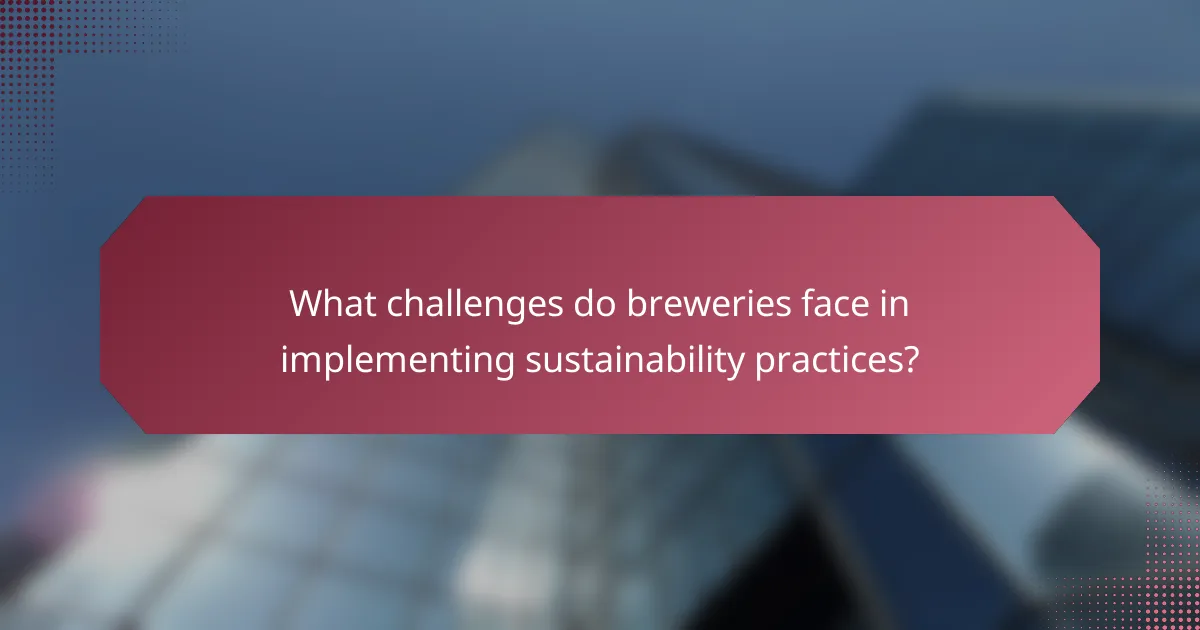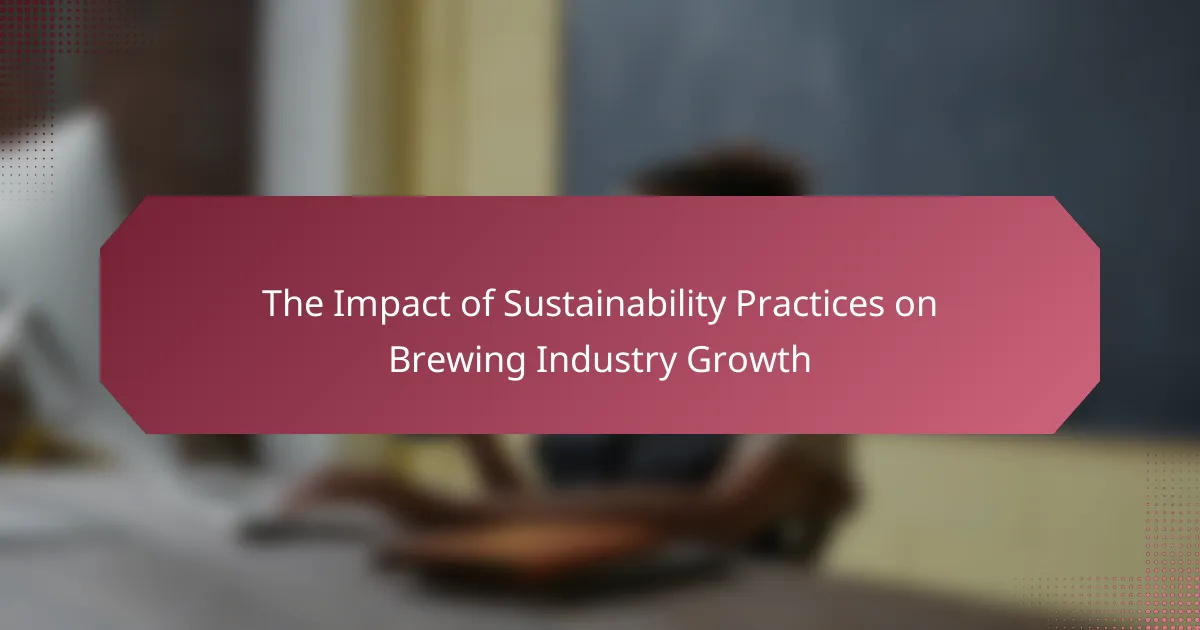The brewing industry is increasingly adopting sustainability practices to minimize environmental impact, focusing on methods such as water conservation, energy efficiency, and waste reduction. Key initiatives include recycling programs, investment in renewable energy sources, and the use of local ingredients to decrease transportation emissions. The Brewers Association reports that 80% of craft breweries have implemented sustainability initiatives, which not only benefit the environment but also enhance brand reputation and consumer loyalty. However, breweries face challenges such as high initial costs, limited access to sustainable materials, and regulatory complexities that can hinder the adoption of these practices. Despite these obstacles, a growing market demand for sustainable products indicates that breweries prioritizing eco-friendly methods may experience increased competitiveness and growth.

What are Sustainability Practices in the Brewing Industry?
Sustainability practices in the brewing industry involve methods that minimize environmental impact. These practices include water conservation, energy efficiency, and waste reduction. Breweries often implement recycling programs for materials such as glass and cardboard. Many also invest in renewable energy sources like solar or wind power.
Additionally, some breweries use local ingredients to reduce transportation emissions. Sustainable farming practices are encouraged to support local agriculture. According to the Brewers Association, 80% of craft breweries have adopted some form of sustainability initiative. This commitment not only benefits the environment but also enhances brand reputation and consumer loyalty.
How do sustainability practices influence the brewing process?
Sustainability practices significantly influence the brewing process by reducing environmental impact. Breweries implement energy-efficient technologies to minimize energy consumption. For example, using solar panels can decrease reliance on fossil fuels. Water conservation techniques, such as recycling wastewater, are also common. This reduces the overall water usage in brewing, which is critical given the industry’s water-intensive nature. Additionally, sourcing local ingredients lowers transportation emissions. Implementing these practices can enhance a brewery’s brand image. Research shows that consumers increasingly prefer brands that prioritize sustainability. According to a 2021 survey by Nielsen, 73% of millennials are willing to pay more for sustainable products. Thus, sustainability practices not only benefit the environment but also drive consumer loyalty and market growth.
What specific methods are used in sustainable brewing?
Sustainable brewing employs methods such as energy efficiency, water conservation, and waste reduction. Energy efficiency involves using renewable energy sources like solar or wind power. Water conservation techniques include recycling water used in the brewing process. Waste reduction practices focus on minimizing byproducts and repurposing spent grains. These methods help breweries lower their environmental impact. For instance, breweries that implement these practices can reduce energy consumption by up to 30%. Additionally, utilizing local ingredients decreases transportation emissions. These sustainable methods contribute to the overall growth of the brewing industry by attracting environmentally conscious consumers.
How do these methods impact resource consumption?
Sustainability practices in the brewing industry significantly reduce resource consumption. These methods include water conservation, energy efficiency, and waste reduction. For example, breweries implementing water recycling systems can decrease water usage by up to 50%. Energy-efficient brewing processes can lower energy consumption by 20% or more. Additionally, waste reduction strategies can minimize raw material waste, leading to better resource utilization. A study by the Brewers Association found that sustainable practices can save breweries thousands of dollars annually in resource costs. Overall, these methods lead to a more efficient use of resources in brewing operations.
Why is sustainability important for the brewing industry?
Sustainability is crucial for the brewing industry because it reduces environmental impact and enhances brand reputation. Sustainable practices lower water and energy consumption, which are significant costs in brewing. For example, breweries that implement water recycling can reduce water usage by up to 90%. Additionally, sustainable sourcing of ingredients supports local agriculture and reduces carbon footprints. According to a 2021 study by the Brewers Association, 75% of consumers prefer brands that prioritize sustainability. This preference drives sales and fosters customer loyalty. Thus, sustainability not only benefits the environment but also supports economic growth in the brewing sector.
What environmental benefits arise from sustainable brewing practices?
Sustainable brewing practices lead to significant environmental benefits. These practices reduce water usage, with some breweries saving up to 40% in water consumption. They also minimize waste generation by implementing recycling and composting programs. Sustainable brewing often incorporates renewable energy sources, reducing carbon emissions by as much as 30%. Additionally, these practices promote biodiversity by sourcing local ingredients and supporting sustainable agriculture. The use of eco-friendly packaging further decreases environmental impact. Together, these benefits contribute to a healthier ecosystem and promote responsible resource management within the brewing industry.
How does sustainability affect consumer perceptions of breweries?
Sustainability significantly influences consumer perceptions of breweries. Consumers increasingly prefer brands that demonstrate environmental responsibility. A survey by Nielsen found that 66% of global consumers are willing to pay more for sustainable products. Breweries adopting sustainable practices often enhance their brand image. This can lead to increased loyalty among eco-conscious customers. Transparency in sourcing and production further boosts consumer trust. Breweries that engage in community sustainability efforts also attract positive attention. Overall, sustainability shapes consumer preferences, driving growth in the brewing industry.

What is the relationship between sustainability practices and brewing industry growth?
Sustainability practices positively influence brewing industry growth. Implementing eco-friendly methods reduces operational costs. For example, energy-efficient brewing processes lower utility bills. Sustainable sourcing of ingredients can enhance product quality and appeal. Breweries adopting recycling and waste reduction practices often attract environmentally conscious consumers. According to a 2021 study by the Brewers Association, breweries focusing on sustainability reported a 20% increase in sales. This trend indicates that sustainability can drive market competitiveness and brand loyalty. As consumer preferences shift towards greener products, breweries that prioritize sustainability are likely to experience continued growth.
How do sustainable practices contribute to economic growth in brewing?
Sustainable practices contribute to economic growth in brewing by reducing costs and enhancing brand value. Implementing energy-efficient technologies lowers operational expenses. For example, breweries that utilize renewable energy sources can save up to 30% on energy bills. Water conservation techniques also minimize resource usage, leading to lower utility costs.
Additionally, sustainable brewing attracts environmentally conscious consumers. A 2021 survey indicated that 66% of consumers prefer brands committed to sustainability. This preference can increase sales and market share for breweries adopting green practices.
Moreover, sustainable practices can lead to innovation. Breweries investing in sustainable methods often develop new products, creating additional revenue streams. For instance, using spent grains for animal feed can open new markets.
Lastly, sustainability can improve regulatory compliance and reduce risks. By adhering to environmental regulations, breweries avoid fines and enhance their reputation. This positive image can attract investors and foster long-term economic growth.
What are the financial advantages of adopting sustainability in brewing?
Adopting sustainability in brewing offers significant financial advantages. These include cost savings through energy efficiency and reduced waste. Sustainable practices often lead to lower operational costs. For example, breweries that implement energy-efficient systems can save up to 30% on energy bills. Additionally, using local ingredients reduces transportation costs and supports local economies.
Sustainable brewing can enhance brand loyalty and attract environmentally conscious consumers. Studies show that 66% of consumers are willing to pay more for sustainable products. This can increase sales and overall revenue. Furthermore, sustainable practices can help breweries avoid regulatory fines and penalties related to environmental compliance.
Investing in sustainability can also improve access to funding and grants aimed at eco-friendly businesses. This financial support can offset initial investment costs. Overall, the financial advantages of adopting sustainability in brewing are substantial and can lead to long-term profitability.
How can sustainable practices lead to increased market share?
Sustainable practices can lead to increased market share by attracting environmentally conscious consumers. These consumers prefer brands that demonstrate social responsibility. Research shows that 66% of global consumers are willing to pay more for sustainable brands. Implementing eco-friendly processes can also reduce operational costs. Lower costs can enhance profit margins while maintaining competitive pricing. Additionally, sustainability can improve brand loyalty among existing customers. Companies that prioritize sustainability often benefit from positive public relations. This can lead to increased visibility and market [censured]. Overall, sustainable practices align with consumer values, driving growth in market share.
What role does innovation play in the growth of sustainable brewing?
Innovation is crucial for the growth of sustainable brewing. It enables breweries to adopt eco-friendly practices and enhance efficiency. For example, new technologies can reduce water usage by up to 50%. Innovative brewing methods also decrease energy consumption, leading to lower carbon footprints. Furthermore, advancements in ingredient sourcing support local agriculture and minimize transportation emissions. Research shows that breweries implementing innovative sustainability practices see a 20% increase in consumer loyalty. This trend reflects a growing market demand for environmentally responsible products. Thus, innovation not only drives sustainability but also boosts competitive advantage in the brewing industry.
How do new technologies enhance sustainability in brewing?
New technologies enhance sustainability in brewing by optimizing resource use and reducing waste. Innovations such as automated brewing systems improve efficiency in energy and water consumption. Additionally, advancements in fermentation technology allow for better control of the brewing process. This leads to higher yield and less raw material waste. Smart sensors monitor environmental conditions, enabling brewers to adjust processes in real-time. The use of renewable energy sources, like solar and wind, further decreases the carbon footprint of breweries. Data analytics helps identify areas for improvement, driving continuous sustainability efforts. According to a study by the Brewers Association, implementing these technologies can reduce water usage by up to 30%.
What are some examples of innovative sustainable brewing practices?
Innovative sustainable brewing practices include water conservation techniques, energy-efficient brewing equipment, and waste reduction strategies. Many breweries implement closed-loop water systems to recycle water used in the brewing process. This can reduce water usage by up to 90%.
Energy-efficient brewing equipment, such as high-efficiency boilers and heat recovery systems, minimizes energy consumption. Some breweries utilize renewable energy sources like solar or wind power to further decrease their carbon footprint.
Waste reduction strategies include repurposing spent grains for animal feed or creating value-added products like granola bars. Breweries like New Belgium Brewing have successfully implemented these practices, showcasing their commitment to sustainability.

What challenges do breweries face in implementing sustainability practices?
Breweries face several challenges in implementing sustainability practices. High initial costs for sustainable technologies often deter investment. Limited access to sustainable materials can hinder efforts to reduce environmental impact. Regulatory compliance can be complex and varies by region, complicating implementation. Additionally, a lack of knowledge about sustainable practices can prevent effective adoption. Market demand for sustainable products is growing, but consumer awareness remains inconsistent. These factors collectively make it difficult for breweries to fully embrace sustainability.
How can breweries overcome barriers to adopting sustainable practices?
Breweries can overcome barriers to adopting sustainable practices by implementing strategic changes. First, they can invest in training programs to educate staff about sustainability. This knowledge helps to foster a culture of environmental responsibility. Second, breweries should collaborate with local suppliers to source sustainable materials. This reduces transportation emissions and supports the local economy. Third, they can adopt energy-efficient technologies to minimize resource consumption. For instance, using solar panels can significantly lower energy costs. Additionally, breweries can engage in community initiatives to raise awareness about sustainability. This builds goodwill and encourages consumer support. Financial incentives from government programs can also facilitate the transition to sustainable practices. Studies show that breweries adopting these strategies often see improved profitability and brand loyalty.
What are common misconceptions about sustainable brewing?
Sustainable brewing is often misunderstood. One common misconception is that it is only about using organic ingredients. While organic ingredients are important, sustainable brewing encompasses a broader range of practices. These include water conservation, energy efficiency, and waste management.
Another misconception is that sustainable brewing is too expensive. In reality, many sustainable practices can reduce costs in the long term. For example, energy-efficient equipment can lower utility bills.
Some believe that sustainable brewing sacrifices quality. However, many breweries report that sustainable practices enhance flavor and product quality. This is due to better ingredient sourcing and improved brewing methods.
Lastly, there is a belief that only large breweries can implement sustainable practices. In fact, small and independent breweries can adopt sustainable methods effectively. Many have successfully integrated sustainability into their operations, showing that size does not limit the ability to be sustainable.
How can collaboration within the industry support sustainability efforts?
Collaboration within the brewing industry can significantly enhance sustainability efforts. When breweries work together, they can share best practices and innovative solutions. This shared knowledge helps reduce resource consumption and waste. Collaborative initiatives, such as joint purchasing agreements, can lower costs for sustainable materials. Additionally, partnerships can lead to collective investments in renewable energy sources. For example, breweries that collaborate on energy projects can achieve greater efficiency than individual efforts. Research shows that collaborative sustainability initiatives can lead to a 30% reduction in carbon emissions across participating entities. This evidence highlights the effectiveness of collaboration in driving sustainability within the brewing industry.
What are the best practices for breweries looking to enhance sustainability?
Breweries can enhance sustainability by implementing energy-efficient technologies. These technologies reduce energy consumption and lower operational costs. For instance, using solar panels can decrease reliance on non-renewable energy sources. Breweries should also focus on water conservation techniques. Techniques like closed-loop water systems can significantly reduce water waste.
Additionally, sourcing local ingredients minimizes transportation emissions. This practice supports local economies while reducing carbon footprints. Breweries can also adopt waste management strategies. Composting spent grains and recycling packaging materials are effective methods.
Investing in sustainable packaging options can further enhance environmental responsibility. Biodegradable or recyclable materials reduce landfill waste. Finally, engaging in community sustainability initiatives fosters a positive brand image. These practices collectively contribute to a more sustainable brewing operation.
What steps can breweries take to measure their sustainability impact?
Breweries can measure their sustainability impact by implementing specific metrics and assessments. First, they should track energy consumption and source renewable energy. This can include measuring kilowatt-hours used per barrel produced. Second, breweries should assess water usage and implement water conservation measures. They can measure gallons of water used per barrel of beer produced. Third, waste management practices should be evaluated. Breweries can calculate the percentage of waste diverted from landfills. Fourth, they can conduct carbon footprint assessments. This involves measuring greenhouse gas emissions from production processes. Additionally, breweries can engage in life cycle assessments (LCAs). LCAs analyze environmental impacts throughout the product’s life, from raw material extraction to disposal. Finally, breweries can utilize sustainability reporting frameworks. These frameworks, like the Global Reporting Initiative (GRI), provide structured guidelines for reporting sustainability metrics.
How can breweries effectively communicate their sustainability efforts to consumers?
Breweries can effectively communicate their sustainability efforts to consumers through transparent messaging. Clear labeling on products can highlight sustainable practices. Engaging storytelling on websites can showcase their environmental initiatives. Social media platforms can be used to share updates and achievements in sustainability. Collaborating with local environmental organizations can enhance credibility. Hosting community events focused on sustainability can foster consumer engagement. Utilizing certifications such as organic or fair trade can provide assurance to consumers. Research shows that 66% of consumers are willing to pay more for sustainable brands, indicating the importance of effective communication.
The primary entity in this article is sustainability practices within the brewing industry. The article examines how these practices, including water conservation, energy efficiency, and waste reduction, significantly reduce environmental impact while enhancing brand reputation and consumer loyalty. It highlights the financial advantages of adopting sustainable methods, such as cost savings and increased market share, and discusses the role of innovation and collaboration in promoting sustainability. Additionally, the article addresses common misconceptions and outlines best practices for breweries to effectively communicate their sustainability efforts to consumers.



